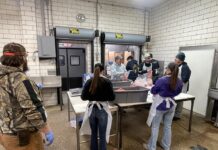DALTON, Ohio — The 50-plus venders present for the North Central Ohio Dairy Grazing Conference — held Jan. 24-25 in Dalton — offered a wide variety of farm-related products and services.
But, according to Michigan dairy grazier Ben Bartlett, the featured speaker for the 12th annual conference, more than half of the products available were really the same thing: new information.
Bartlett said most of what is sold to farmers today is not really a new product, but new information — a new way of doing things we’ve been doing for a long time.
While the technology is certainly part of the product, the “human creativity” that went into the technology “is equally important,” he said.
And so it is with most dairy grazing operations. Personal choice usually determines the degree of success or failure, and the more creative and thoughtful, usually the more successful the farm.Bartlett spent the day talking about holistic management — a program for finding the best possible balance for each producer, and maximizing the potential for a successful outcome.
“You take where you want to start out, where you want to end up, and you put in some new knowledge and you put some tools with it,” he said.
Be inspired
Bartlett is a retired grazing educator from Michigan State University, and now works as a veterinarian and a low stress handling and grazing specialist.In his speech about the “blueprint” for grazing, he encouraged producers to be inspired, informed and to take action on their individual farm plan.
In addition to new products, graziers need to explore new ways of thinking, behaving and making decisions.
“It will take new knowledge and skills and a change in your behavior to generate new results,” he said.
He shared a sample copy of a yearly grazing plan, challenging producers to write out their plans and be specific.
Plans should include short- and long-term goals, the strategy and tactics for achieving those goals, and a regular monitoring/assessment as to how well the plan is going.
He said producers should identify their weak links, because those same things are what holds the greatest opportunity, if they are improved.
“Dairy graziers should ask themselves, ‘What are the weak links in 2013 that are going to prevent you from not doing a better job?’ Because, when you think about this, your problems are your opportunities. Your biggest problem is your biggest opportunity.”
The conference drew 600-plus attendees each day and included the usual mix of farmer panels. In an afternoon session on “Surviving hard times: When to be frugal and when to spend,” farmers Jesse Meerman of Coopersville, Mich., Clarence Miller of Brinkhaven, David Miller of Becks Mills and Henry Yoder of Goose Creek Bottom, discussed common sense ways to prepare for unforeseen challenges.
Record keeping
Clarence Miller said a big thing is to keep good records.
“You got to know your numbers,” he said. “How much milk check you can afford to lose to still make your payments.”Meerman said when times are good, he does what he can to save and prepare for when they turn bad.Commenting on their faith, several of the men on the panel said “trusting in the Lord” is the most important thing, and remembering that they serve the Lord first in their work.
In a session on managing drought, Bartlett reminded producers of the need to pay attention to variation, and “plan your operation around variation.”This past year saw record yield variation from one of the worst droughts in 50 years, and some farmers struggled to buy enough hay and grain for their animals.
Yields and cow-quality forage vary every year and Bartlett reminded farmers to think conservatively — even if it means applying old knowledge.“It’s hard to go broke with a barn full of hay,” he said.










